




 |
   |
 |
|
The Normals Larry Norman North Mississippi Allstars Northern Pikes |
Tone Norum Novalis Apollo Nove |
Novela The Now Generation Nowy |
Ñu Nuova Idea Erwin Nyhoff |
Erik Norlander (US) see: |
 |
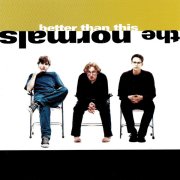 |
Better Than This (1998, 52.40) **/T |
|
| Better Than This Song and Dance Someone to Believe Everything (Apron Full of Stains) What I Cannot Earn I Need You If Tomorrow Was Forever What's Ailing Norman? |
Daddy's Girl Running From the Sun Forgive Take My Life Public Domain |
|
Current availability:
Mellotron used:
The Normals (named for their hometown of Normal, IL, fact fans) were a Christian indie trio, for their sins (appropriately enough), whose 1998 release, Better Than This, was the first of their three albums. Given the oceans of slop produced by the 'faith' scene, this is actually relatively benign, although both lyrics and music start to grate after a while, less irritating material including the opening title track and What's Ailing Norman?
The booklet credits are a little confusing, 'noted Christian producer' Billy Smiley being credited with Mellotron on Forgive, one of two tracks recorded at Memphis' legendary Ardent Studios. However, it actually appears on the other Ardent track, Better Than This itself, with upfront flute, cello and string parts, presumably from the studio's M400.
 |
So Long Ago the Garden (1973, 35.46) **/TMeet Me at the Airport (Fly, Fly, Fly)It's the Same Old Story Lonely By Myself Be Careful What You Sign Baroquen Spirits Christmas Time She's a Dancer Soul Survivor Nightmare #71 |
Current availability:
Mellotron used:
If you can believe the insane hagiography of Larry Norman's Wikipedia entry, he was a leading light in the pre-CCM Jesus Rock movement, releasing his best-known work between the late '60s and mid-'70s. Said entry claims that he released over a hundred albums in his lifetime (he died in 2008 at the age of sixty), but, going by the list, many of those are compilations, bootlegs and other 'don't counts'. 1973's So Long Ago the Garden was apparently his favourite, but, to the secular ear, it's no more than a dullsville soft-rock singer-songwriter effort with tedious, goddy lyrics, the nearest it gets to a highpoint being the Dylanesque talking blues Nightmare #71.
Again, according to Wikipedia, Lonely By Myself, "...was recorded using the same Mellotron The Beatles used on Strawberry Fields Forever while Paul McCartney was in the next room recording Live And Let Die", to which I say: bullshit. Because? Because the track contains Mellotron choirs, not available on the (Abbey Road) MkII used for Strawberry Fields. It may well be one of Macca's M400s, but this one 'fact' displays the level of accuracy and pathetic hero-worship of his Wiki entry. Believe at your peril. Anyway, an exceedingly dull album with one passable Mellotron track. Maybe not.
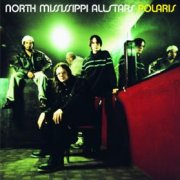 |
Polaris (2003, 45.04) ***/T |
|
| Eyes Meet Me in the City Conan All Along Otay Kids These Daze One to Grow on Never in All My Days |
Bad Bad Pain Polaris Time For the Sun to Rise Be So Glad |
|
Current availability:
Mellotron used:
The North Mississippi Allstars are fronted by legendary (and now late) producer Jim Dickinson's (Big Star) sons Luther and Cody, whose remit appears to be 'sound as much like a '70s band as possible'. Do I have a problem with this? No I don't. However, their third album, 2003's Polaris, is good, yet not great; the songs aren't bad, but there's a faint air of second-handness about it all, I'm afraid. Better tracks include Otay and Kids These Daze, but their southern soul influences spoil many a halfway decent track (personal opinion, obviously). And, er, what's with the bloke rapping on Be So Glad? Doesn't work at all, guys. Throwing a quick version of The Allmans' Jessica in at the end of the album is reasonably witty, though.
Dad plays Ardent Studios' Mellotron, a.k.a. the M400 pictured on one of Big Star's Third issues. Anyway, we get strings and flutes on All Along; while it could be elsewhere, that appears to be it for definite. Not bad, but a little disappointing, far less Mellotron than there might've been.
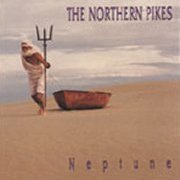 |
Neptune (1992, 66.12) **/T |
|
| Twister Believe All This Man Can Do Worlds Away Why Cry Somedays Crocodile Tears What it's Really About |
Hold on Chain of Flowers Françesca Everything Straight Line Black Cat The Way You Are |
|
Current availability:
Mellotron used:
It's impossible to tell from the sleeve of the Northern Pikes' Neptune what it's going to sound like, although there are several things I would've guessed before a Springsteen/Bryan bloody Adams crossover thing. Opening with the barroom boogie of Twister is not designed to appeal to my good self, not that I'd imagine they give a shit. Least offensive tracks? Françesca and Straight Line. And why exactly does closer The Way You Are start with a quick orchestral sample of a snatch of Mussorgsky's Night On Bare Mountain?
Mellotronically speaking, credited choirs on Believe from Greg Johns and uncredited strings on Chain Of Flowers, including a Mellotron solo on the intro and Straight Line, which may or may not be from Ross Nykiforuk, who gets a generic 'keyboards' credit in the booklet. An overlong album, then, especially for the straightforward style the band peddled, with very little Mellotron. Next...
 |
Red (1990, 50.29) **½/½ |
|
| How Does it Feel? Ordinary Girl Laughter Stay With Me With His Smile Bitter-Sweet 10 Times Out of 1 Done it All Before |
My Man It's Only Life The Newly Wed Femme Fatale |
|
Current availability:
Mellotron used:
Tone Norum, younger sister of Europe's John, had an effective ten-year career, kicking off in the mid-'80s. 1990's Red is her third album of five, throwing everything into the pot, from opener How Does It Feel?'s acoustic pop through With His Smile's Euro-balladry, Bitter-Sweet's jazzy blues, 10 Times Out Of 1's brassy pop/rock... You get the idea. Any better tracks? Maybe My Man's thumping drum'n'brass (yes, brass) arrangement, which is at least fairly original, while The Newly Wed's Hammond-driven dark balladry's actually halfway decent.
Max Lorentz plays Mellotron on With His Smile, wobbly flute chords buried under the middle eight, although the song's strings sound like generic samples. Given that this was largely recorded at Abba's Polar Studios, is this a late outing for their machine? Explains why it sounds on the edge of terminal breakdown.
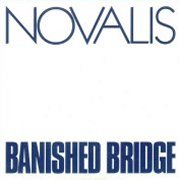 |
Banished Bridge (1973, 37.35) ***½/½Banished BridgeHigh Evolution Laughing Inside of Me (Inside of You) |
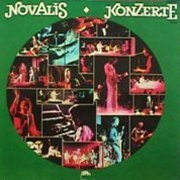 |
Konzerte (1977, 61.28) ****/T½ |
|
| Bolero Dronsz Es Färbte Sich die Wiese Grün Impressionen Wer Schmetterlinge Lachen Hört Wunderschätze |
Sommerabend Wetterleuchten Am Strand Der Traum Ein Neuer Tag Ins Licht |
|
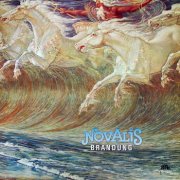 |
Brandung (1977, 33.00) ***½/T½Irgendwo, IrgendwannWenn Nicht Mehr Zahlen und Figuren Astralis Sonnenwende Brandung Feuer Bricht in die Zeit Sonnenfinsternis Dämmerung |
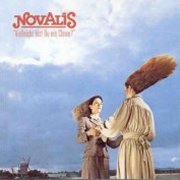 |
Vielleicht Bist du ein Clown? (1978, 34.43) ***/T½Der GeigenspielerZingaresca Manchmal Fällt der Regen Eben Lang Vielleicht Bist du ein Clown City Nord Die Welt Wird Alt und Wieder Jung |
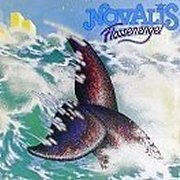 |
Flossenengel (1979, 45.14) ***/T |
|
| Atlanto Im Brunnen der Erde Brennende Freiheit Im Netz Flossenengel Walzer für Einen Verlorenen Traum Sklavenzoo Alle Wollen Leben |
Rückkehr Ob Tier, ob Mensch, ob Baum |
|
Current availability:
Mellotrons used:
Novalis are one of those odd, frequently German bands who owned a Mellotron (an EMI M400 in this case, fact fans), then either barely used it, or buried it below layers of other stuff (see: Mythos). Why? I keep thinking I can hear it on their records, only to realise it's real flute, or string synth, so it's quite possible it was also used on their two best albums, 1975's Novalis (****) and the following year's Sommerabend (****), although it's not specifically credited on either. For some reason, apart from the enormously dull Eloy, who were on German EMI, the best German prog bands seemed to end up on Brain, the next rung down were on Pilz, leaving the also-rans on Sky; Novalis were on Brain for much of their history and seem to me to be the country's third most popular home-grown prog outfit, after Eloy and another Brain band, the splendid Grobschnitt.
Banished Bridge is a pleasant, if slightly ineffectual album, side two unable to match the side-long title track in the quality stakes. The English-language vocals are a bit of a distraction, to be honest, which the band quickly rectified by ditching them, but the music's not bad, in a drifting sort of way. None of Grobschnitt's dynamics here; Novalis were defiantly laid-back, almost to the point of being laid-out in places. Lutz Rahn is credited with the usual organ/piano/Mellotron/synth, but, as stated above, it's pretty hard to spot the Mellotron. The choirs on Banished Bridge itself don't sound like any of the standard sounds, but with only one band member credited with vocals, they're unlikely to be massed backing vox. Some faint strings on High Evolution may be Mellotron, too, as could the solo trumpet sound on Inside Of Me (Inside Of You), but it really is hard to tell.
1977's Konzerte is incredibly long for a single LP (I own shorter doubles), the sound suffering on vinyl. It effectively consists of the bulk of their two previous albums, only one track missing from each and nothing from Banished Bridge; to be fair, they had changed their sound considerably in the interim. After the presumed non-Mellotronness of Novalis and Sommerabend, you would've thought that a live album with an M400 specifically credited would finally feature the instrument a little more prominently. But no. Rahn's over-reliance on his Solina smothers the sound in long, sustained string parts, although the Mellotron does turn up in places. Impressionen and Wunderschätze feature flute parts from new member Fred Mühlböck, doubled on Mellotron flutes, while I think it's Mellotron flutes and maybe choir on the excellent Wer Schmetterlinge Lachen Hört, but Rahn obviously believed in hiding its light under a bushel, for reasons best known to himself. I still can't decide which keyboard makes the pitchbent string sounds on Sommerabend; it sounds more like string synth than Mellotron, but you can't pitchbend a Solina, so who knows? The flute melody on its opening and closing parts (Wetterleuchten and Ins Licht) sound Mellotronic, too, with a final note below the range of the regular flute, but within the Mellotron's.
Recorded and released later the same year, Brandung has a more upbeat sound, presumably in keeping with the times, although the material is generally of a lower standard than on their previous two albums. Irgendwo, Irgendwann starts the album off nicely enough, while Wenn Nicht Mehr Zahlen Und Figuren is a pleasant enough ballad, but the side-long Sonnenwende is nowhere near as good as Sommerabend, for example. Rahn's Mellotron is limited to a few string notes on Irgendwo, Irgendwann, flutes (alongside the real one) on the first part of Sonnenwende, Brandung itself and choir on part three, Sonnenfinsternis (thanks for those, Tommy).
Novalis' last even remotely 'progressive' album, Vielleicht Bist du ein Clown?, actually features more Mellotron than anything else in their catalogue, for some odd reason, although that Solina's as high in the mix as ever. Der Geigenspieler has some quite upfront strings and Die Welt Wird Alt Und Wieder Jung has both cellos and strings, so, although the album's no better than 'average', there's more Mellotron here than on anything else they recorded. Oh, and the inner sleeve pic is exactly the same as the one inside Brandung's gatefold, which was shatteringly lazy of someone in Brain's art department. They make up for it slightly by having a Hipgnosis sleeve, but it's not exactly one of their classics, either. Their last Mellotron album was '79's Flossenengel, which is as good as its predecessor, maybe (surprisingly) marginally better. Novalis seemed to tap into a Pink Floyd vein on some tracks, notably side one's eight-minute Im Netz. It's a bit of a cheek calling this a Mellotron album at all, although the strings on Walzer Für Einen Verlorenen Traum are quite upfront, but there's nothing else to be heard.
Hmmm. Not a bad band, but generally a little uninspired, to be brutally honest. If you're going to buy one album, make it Konzerte, since it covers most of their best material, while also being their 'best' Mellotron album, which isn't saying much. For the enthusiast, all the above are just about worth hearing, plus Novalis and Sommerabend, although Flossenengel's follow-up, Augenblicke (**½) is pretty average fare and anything after that's a waste of time. One other related release that's actually worth the effort is Lutz Rahn's solo album from '78, Solo Trip, which probably features about as much Mellotron as in Novalis' entire career. Odd.
See: Lutz Rahn
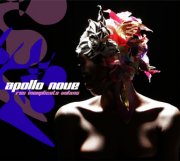 |
Res Inexplicata Volans (2006, 48.45) **½/TT |
|
| Mr Right Now Traz Um Alivio Inexplicata Ensaboar Você Children of the Sun 86 War |
Fruta Vermelha I'm a Rocker Yage Cameras Capoeira Entre eu e Você |
|
Current availability:
Mellotron used:
Apollo Nove (nine) is a big-name Brazilian producer, apparently, who also either owns a Mellotron (one of a single-figure number on the continent) or uses samples well enough to fool my (admittedly blasted) ears. I go for the former, for what it's worth. He's also added it to other artists' work, notably Cibelle and Otto; now it's time to use it himself.
Res Inexplicata Volans is, in many ways, a typical modern Latin record, keeping one foot in the past (the rhythms) and one in the present and future (the sounds), which isn't going to especially endear it to most of you, I'd imagine, although it does what it does perfectly well. He uses different vocalists on most tracks, male and female, which at least adds some variety to the largely mid-paced material. Best moment? Without a doubt, it's I'm A Rocker, better known as Rocker by AC/DC, turned into a smooth, female-fronted Latin number, the line, "I'm a wicked woman stealer" switched to "boyfriend". And it's got a Mellotron on it. Nove plays it himself, of course, with strings on Mr Right Now, Ensaboar Você, the aforementioned I'm A Rocker and Entre Eu E Você, strings and flutes on 86 and cellos on Capoeira, although the only part with any real guts is on (you guessed it) I'm A Rocker.
See: AfroReggae | Cibelle | Otto | Freezone
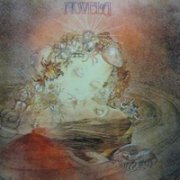 |
La Songerie (1980, 45.00) ***½/TT½IllusionNight With No Name Unbelieving Words Letticia The Boyhood - The Cliff La Songerie |
 |
Requiem (1981, 30.09) ***/T½RequiemPart 1 Part 2 Part 3 Metamatic Lady Dance Nightmare Secret Love Ready to Fantasy |
Current availability:
Mellotrons used:
Novela seem to be regarded as one of the leading lights in Japan's progressive scene of the early '80s, although, to my ears, they have more in common with the epic hard rock approach of, say, the Japanese-American Mariner. Their standing could have as much to do with their influence as anything else; guitarist Terutsugu Hirayama went on to form the highly-regarded Teru's Symphonia, while keyboard player Toshio Egawa formed Gerard, still active today.
Their debut, 1980's La Songerie, divides its running length between shorter, heavier songs (Illusion, Night With No Name) and longer, more progressive outings (Letticia, The Boyhood - The Cliff), where Egawa really comes into his own. Like so much Japanese prog, there is little here that could be described as original, although the second half of the record has some lovely moments, not least the acoustic guitars halfway through the title track. Egawa's credited with Mellotron, but the bulk of the album's string sounds come from or appear to come from a string- or polysynth, the chief exception being a burst of Mellotronness in the middle of Letticia and a mix of Mellotron and synth strings running through the title track. Apart from some Mellotron choirs on The Boyhood - The Cliff, the album's other main Mellotron use is an excellent flute part and some 'are they/aren't they?' choirs, also in La Songerie itself, making this by far and away the album's top Mellotron track. I haven't heard the CD version, but it adds a shorter track at the end, Shoot A Burning Arrow, Mellotron content unknown.
The following year's Requiem seems to be a stopgap release, a half-hour mini-album, two of whose tracks are repeated on their full-length release later the same year. Its centrepiece and highlight, unsurprisingly, is the fourteen-minute, three-part title track, although it doesn't match the best material on La Songerie. The rest of the album is a distinctly mixed bag, the balls-out metal of Metamatic Lady Dance contrasting sharply with the more mainstream proggy hard rock of the final three tracks, leaving Requiem itself as the only even close to essential track here. A couple of tracks of obvious Mellotron from Egawa this time, with full-on string parts in the first two sections of Requiem itself, with overdubbed background choirs, although that's it for the release. There's supposed to be more Mellotron on the same year's full release, Sanctuary, but all I can hear is choirs from maybe a Roland VP-330 vocoder; definitely not Mellotron, anyway.
See: Gerard
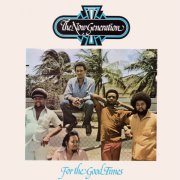 |
For the Good Times (1974, 41.57) ***/TT½ |
|
| Children of the Night Baby Don't Do it For the Good Times Alone Again Naturally Stoned in Love With You Ben Guitar Man Reggae People Make the World Go Round |
Everything (Version) If I Don't Get You Back Again You'll Never Know It's Too Late |
|
Current availability:
Mellotron used:
The Now Generation consisted of Jamaican studio veterans, including Boris Gardiner, Geoffrey Chung and Tyrone Downie, amongst other familiar names. 1974's For the Good Times was possibly their second album, of a possible two (Discogs, eh?), largely consisting of reggae takes on other people's songs, writers including Kris Kristofferson, Bread's David Gates, Carole King and two by Gilbert O'Sullivan. Best tracks? My preference is for the album's several instrumentals, notably Guitar Man Reggae.
Robbie Lyn or Earl "Wire" Lindo play Mellotron, with orchestral-replacement strings on O'Sullivan's Alone Again Naturally and People Make The World Go Round, chordal strings and flutes and a cello line on Guitar Man Reggae and a flute line on If I Don't Get You Back Again. Session man reggae: a little soulless, but possibly a better listen than some of the genre's more 'authentic' records.
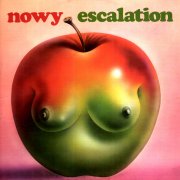 |
Escalation (1974, 35.58) ***½/T½Blue SilverManomolela News From the Chicken Farm Sixteen Flutes I'd Rather Sell My Life, Than My Guitar Escalation |
Current availability:
Mellotron used:
Flautist/saxophonist Ralf Nowy (1940-2007) had a long and honourable career as frontman, session player, arranger and producer, working with Giorgio Moroder in the latter's pre-disco era. To my knowledge, 1974's Escalation (credited to merely Nowy) was his second solo album, eschewing his debut, the previous year's Lucifer's Dream's krautrock grooves for his natural home, fusion, although the album contains a good helping of progressive stylings. The five short tracks on side one switch between jazz (opener Blue Silver, News From the Chicken Farm), a Latin/hard rock hybrid (Manomolela), massed flute jazz (Sixteen Flutes) and off-kilter blues rock (I'd Rather Sell My Life, Than My Guitar), but the album's centrepiece is its side-long title track, a jazz/classical/rock tour de force, not devoid of humour: note the guitarist's Glenn Miller quote towards the end. I think it's safe to say that you've probably never heard anything quite like this before; its component parts are nothing new, but their combination produces a unique piece, although I'll admit it might be slightly overlong.
Thor Baldursson plays Mellotron, choirs (including a nice solo sequence), alongside real voices on the title track, although I suspect that all the flutes on, er, Sixteen Flutes are real. I don't believe this is on CD, but now it's turned up on download sites, make the effort to track it down; you'll thank me when you hear Escalation itself. Maybe.
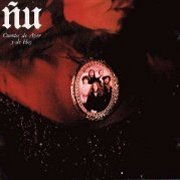 |
Cuentos de Ayer y de Hoy (1978, 37.31) ***½/T½ProfecíaPreparan Algunos Músicos Fueron Nosotros Cuentos de Ayer y de Hoy El Juglar Paraíso de Flautas |
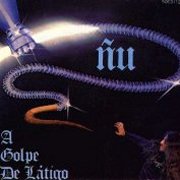 |
A Golpe de Látigo (1979, 41.11) ***½/TEntrada al ReinoA Golpe de Látigo A la Caza de Ñu El Flautista La Galería Velocidad La Ilegada de los Dioses El Expreso |
Current availability:
Mellotrons used:
Ñu were surprisingly heavy for a Spanish progressive outfit, to the point where they could be said to be more of a hard rock band with progressive tendencies, despite the flute and violin they utilised in places. Cuentos de Ayer y de Hoy and A Golpe de Látigo were their first two albums and, in fact, the only ones for some years, before they reconvened in the mid-'80s. It may be a cliché to refer to rocking prog outfits with a flute as 'Tull-influenced', but Ñu really were, José Carlos Molina's flute playing being more than a little reminiscent of Mr. Anderson's, but it's easy to overlook the influence and just take the band on their own merits.
It's difficult to pinpoint highlights on Cuentos de Ayer y de Hoy, most of the tracks being pretty much on a level, although original LP closer Paraíso De Flautas is a possible highlight. Jose María Garcia and Molina both play Mellotron; I'm not so sure about the strings on Profecía and El Juglar, although they're probably Mellotron under real violin, but the strings and flute on Paraíso De Flautas are most definitely Mellotronic, making the other two tracks more likely, I suppose. A Golpe de Látigo is essentially more of the same, with no obvious stylistic changes and, again, the album's final tracks are probably its best. The first sound you hear on the album is the Mellotron brass that opens Entrada Al Reino (from Molina and/or Jorge Calvo), although there's not a lot more to be heard, with some strings under the violin on La Ilegada De Los Dioses and a few upfront string chords at the end of El Expreso.
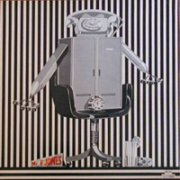 |
Mr. E. Jones (1972, 42.29) ***½/TSveglati EdgarMr. E. Jones Viaggio Nel Mondo dei Sogni Un'Ora del Tuo Tempo Fumo di una Sigaretta Illusione da Poco Premio di una Vita Un Altro Giorno |
Current availability:
Mellotron used:
Although PFM's first two, Italian-language albums are frequently thought of as the 'first' Italian prog albums, this is blatantly not the case; ask Le Orme, amongst others. Mr. E. Jones was Nuova Idea's second album, fitting into the 'early Italian prog' category without a murmur, featuring inventive, varied, symphonic material without the 'pastoral' feel that PFM would memorably bring to the scene later the same year. There's a blues base to some of the tracks (notably Premio Di Una Vita) that would be expunged from the more purist outfits before long, although its inclusion here reminds the listener that Italian prog wasn't always (mistakenly) characterised by acoustic guitars and flutes.
There's very little of Giorgio Usai's Mellotron work to be heard, with nowt but a short combined string/brass part on Illusione Da Poco, although a couple of keyboard parts earlier in the album could just possibly be Mellotron brass or cellos, although an odd organ patch seems just as likely. Nuova Idea signed off with '73's Mellotron-free Clowns, finishing a short but inventive career. So; should you buy Mr. E Jones? Not for the Mellotron, no, but as a good example of early Italian progressive, this is better than anything by the better-known (OK, relatively) Quella Vecchia Locanda and vastly better than the overrated The Trip.
See: Underground Set
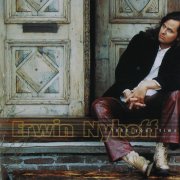 |
Take Your Time (2001, 57.24) ***/TT |
|
| About Our Love Take Your Time Love Come Tumblin' Down Bye Bye Baby Empty Highway Over the Horizon What's Been Said and Done For the First Time |
Don't Change Song for You Getting Higher Eternity Cosmic Ocean (Eternity, pt. 2) |
|
Current availability:
Mellotron/Chamberlin used:
After The Prodigal Sons split, vocalist Erwin Nyhoff apparently kept his head above water doing menial jobs until his solo career took off, triggered by a successful string of TV appearances on The Voice of Holland. 2001's Take Your Time was the first fruit of his resurgence, an album that doesn't seem to be entirely certain where's it's coming from - or going to, for that matter. Highlights include Love Come Tumblin' Down's powerpop, the rocky Getting Higher and the atmospheric closing Eternity/Cosmic Ocean (Eternity, Pt. 2) segue, although run-of-the-mill soulful Americana (Bye Bye Baby, For The First Time) would improve the album by their removal.
Wilco's Pat Sansone plays Mellotron and Chamberlin, with Mellotron strings all over Take Your Time, strings and flutes on What's Been Said And Done, Chamby strings and flutes on Song For You, cello on Eternity and strings on Cosmic Ocean. Decent enough, then, if a little too diverse for its own good. Could also do with losing fifteen minutes of lesser material.